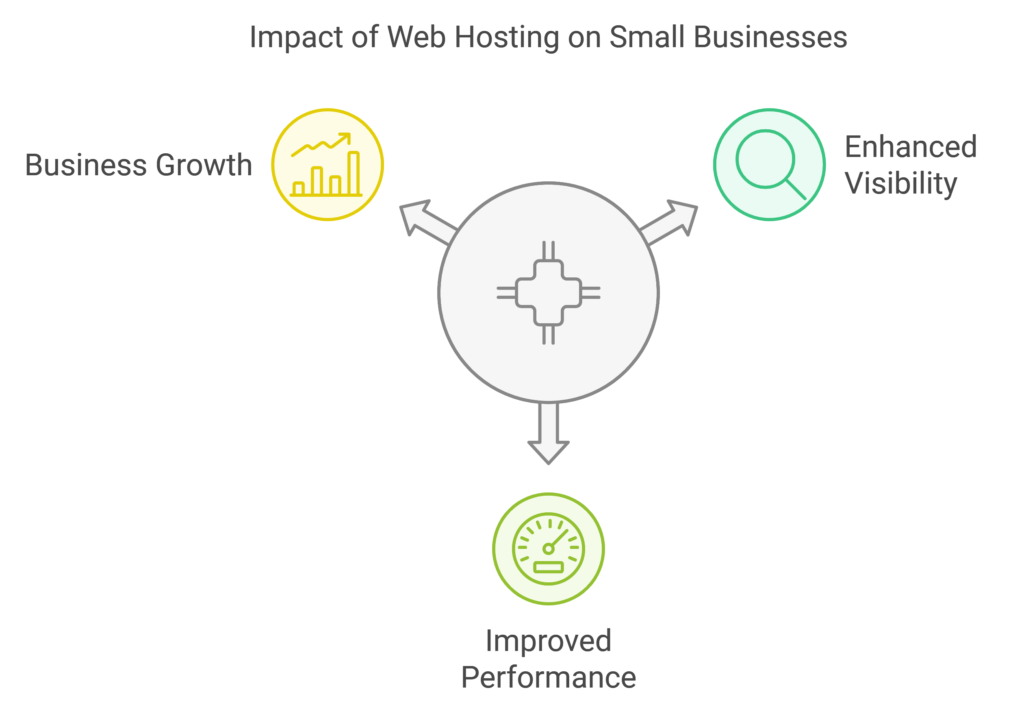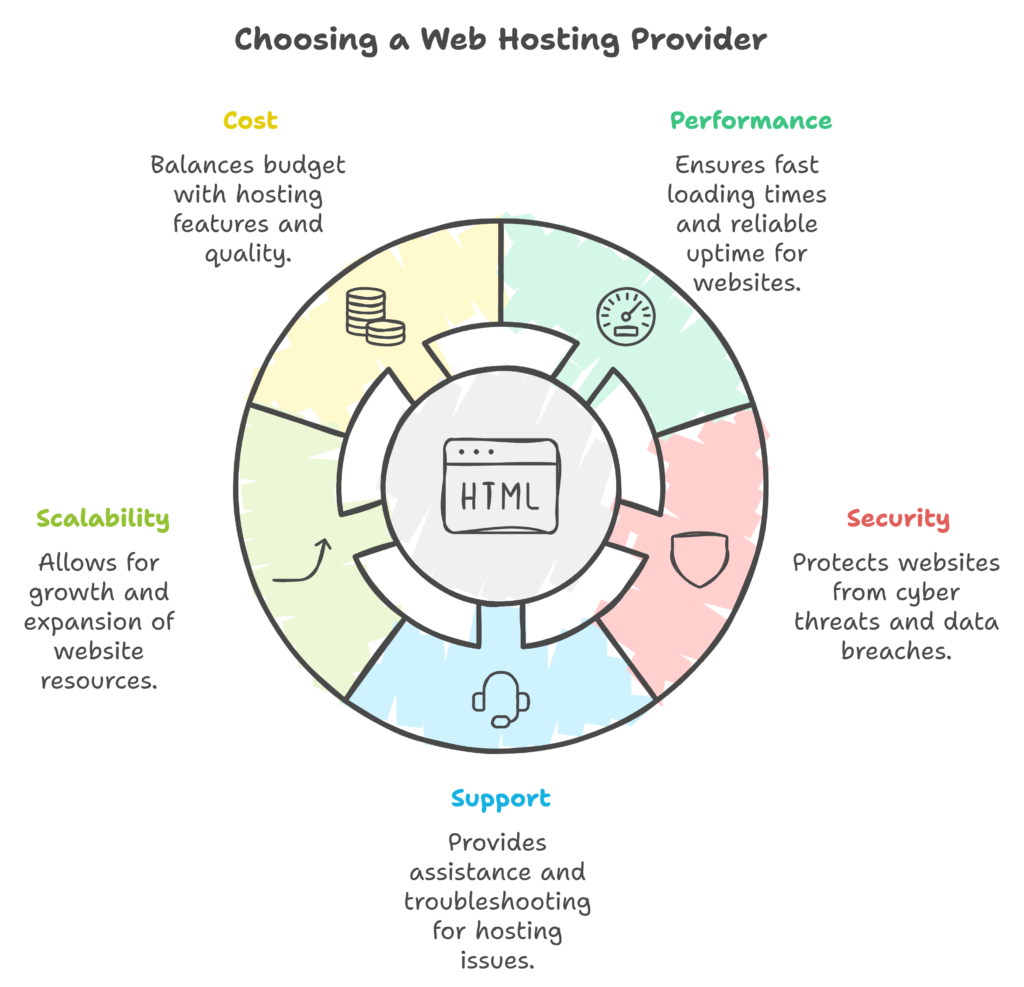In today’s digital era, establishing a robust online presence is vital for the success of any business, particularly for small businesses seeking to thrive in the worldwide market. Choosing the appropriate web hosting service is essential for creating this online presence. Given the multitude of choices accessible, making a well-informed decision can be pretty overwhelming, especially when it comes to Web Hosting For Small Businesses.
Choosing the right web hosting provider is a critical decision for small businesses looking to establish a strong online presence.
By considering factors such as website requirements, uptime, loading speed, customer support, security, and budget, you can make an informed choice that aligns with your business goals. Whether you opt for shared, VPS, dedicated, or cloud hosting, the right hosting platform can contribute significantly to your website’s success and overall business growth.
This article aims to guide small business owners through the process of choosing the best web hosting for their needs, ensuring their website runs smoothly and efficiently while catering to their budget.
Web Hosting for Small Businesses
Before diving into the details of selecting a web hosting service, let’s understand why choosing the right hosting provider matters for small businesses. Your website is often the first point of contact for potential customers, and it needs to load quickly, operate without downtime, and offer a seamless user experience. These factors are not only essential for retaining visitors but also play a crucial role in search engine optimization (SEO).
“Web Hosting for Small Business” Importance:
- Online Presence: Web hosting is paramount for small businesses to establish a solid online presence, enabling them to connect with their target audience.
- Website Availability: Hosting ensures that a business website remains accessible at all times, fostering a seamless interaction with visitors.
- Reliable Uptime: Quality hosting guarantees consistent uptime, minimizing disruptions and ensuring visitors can access the website whenever needed.
- Effortless Setup: With user-friendly interfaces and tools, hosting services make website setup easy, even for those without extensive technical knowledge.
- Scalability: Hosting solutions that offer scalability empower businesses to seamlessly expand their online operations as their needs grow, adapting to increased demand.

Key Factor Choosing Web Hosting for Small Businesses
1. Website Requirements and Scalability
Every small business has unique needs when it comes to their website.
Consider the type of website you’re running. Is it a simple informational site, an e-commerce store, or a blog? Each of these requires different resources. Additionally, think about scalability – can the hosting plan accommodate your growth in the future?
2. Uptime and Reliability
Downtime can cost small businesses revenue and credibility. Look for a web hosting provider that guarantees a high uptime percentage. This ensures your website is accessible to visitors around the clock.
3. Page Loading Speed
Slow-loading websites not only frustrate visitors but also negatively impact your SEO rankings. Choose a web host that offers fast loading times, helping to keep visitors engaged and encouraging them to explore your site further.
4. Customer Support
Responsive customer support is crucial, especially for small businesses that may not have a dedicated IT team. Look for providers that offer 24/7 customer support through various channels, such as live chat, phone, and email.
5. Security Features
Website security is paramount, especially considering the increasing number of cyber threats. Choose a web hosting provider that offers robust security features, such as SSL certificates, firewalls, and regular malware scans.
6. Pricing and Budget
Small businesses often have budget constraints. Compare different hosting plans to find the one that offers the right balance of features and pricing. Keep in mind that the cheapest option may not always provide the best value.

Types of Web Hosting for Small Businesses
1. Shared Hosting
Shared hosting is an economical option for small businesses with limited website traffic. However, since resources are shared among multiple websites on the same server, performance can be affected during traffic spikes.
2. VPS Hosting
Virtual Private Server (VPS) hosting provides more resources and control compared to shared hosting. It’s suitable for businesses that require more customization and better performance without the cost of a dedicated server.
3. Dedicated Hosting
Dedicated hosting offers the highest level of control and resources. While it’s more expensive, it’s ideal for large e-commerce sites or businesses with high traffic volumes.
4. Cloud Hosting
Cloud hosting is flexible and scalable, making it a great option for growing small businesses. Resources are spread across multiple virtual servers, reducing the risk of downtime.
Recommended Web Hosting Providers for Small Businesses
Finding the right web hosting provider can be challenging, so here are a few recommendations to get you started:
1. Bluehost
Bluehost is known for its user-friendly interface, excellent customer support, and a variety of hosting options suitable for small businesses.
2. SiteGround
SiteGround offers fast loading speeds and top-notch security features. Their customer support is highly praised by users.
3. HostGator
HostGator provides affordable hosting plans with a range of features, making it suitable for both beginners and experienced website owners.
4. A2 Hosting
A2 Hosting is known for its high-performance hosting and excellent page loading speeds, ideal for businesses that prioritize website speed.
5. DreamHost
DreamHost offers reliable hosting with a strong focus on website security. They also provide a range of tools to help you build and manage your website.
web hosting Comparison for hosting small businesses:
| Hosting Provider | Features | Pros | Cons | Pricing |
| Bluehost | Free domain
One-click WordPress installation 24/7 customer support |
Reliable uptime Beginner-friendly
Good performance |
Renewal rates can be higher
Limited storage on basic plans |
Starting from $2.95/month |
| HostGator | Unmetered bandwidth
Free website builder 45-day money-back guarantee |
Flexible plans
Affordable prices Good customer support |
Uptime could be better
Upsells during checkout |
Starting from $2.75/month |
| SiteGround | Free site migration
SuperCacher for speed Free daily backups |
Excellent performance
Top-notch customer support Free SSL certificate |
Limited storage on entry-level plans
Higher renewal rates |
Starting from $6.99/month |
| A2 Hosting | Turbo servers for speed
Free site migration Anytime money-back guarantee |
Swift performance
Great uptime Developer-friendly features |
Slightly higher prices
Limited phone support |
Starting from $2.99/month |
| DreamHost | Unlimited traffic
Free domain privacy 97-day money-back guarantee |
Transparent pricing
Solid uptime Eco-friendly hosting |
No cPanel interface
Limited live chat support |
Starting from $2.59/month |
Cheap web hosting for small business
When considering “cheap web hosting for small businesses,” affordability should not sacrifice essential features. It should deliver reliable performance and great storage.
- Key Considerations for “Cheap Web Hosting for Small Business”:
- Affordability: Budget-friendly pricing suitable for small businesses.
- Reliable Performance: Ensuring consistent website accessibility and speed.
- Adequate Resources: Offering sufficient storage, bandwidth, and scalability.
- Customer Support: Responsive and knowledgeable assistance.
- Efficient Load Times: Quick page loading for optimal user experience.
- Security Features: Including SSL certificates and robust protection against cyber threats.
- User-Friendly Control Panel: Simplified management for website operations.
- Uptime Guarantee: Ensuring website availability without frequent downtime.
- Backup Solutions: Regular data backups to prevent data loss.
- Value Beyond Price:
- Combines affordability with essential features.
- Empowers small businesses to compete online effectively.
- Enables growth and online visibility without compromising quality.





